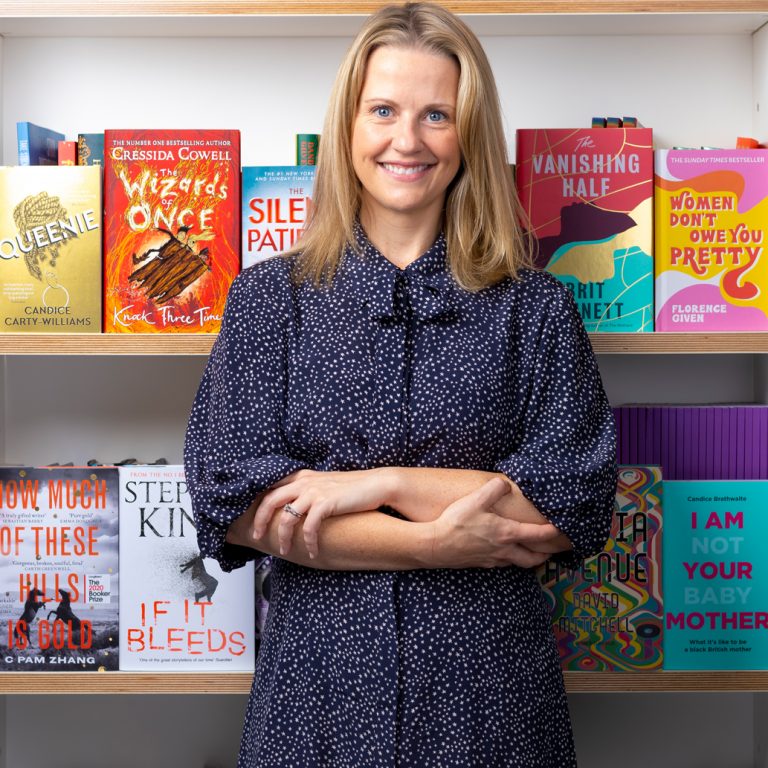If ever an industry was threatened by the relentless march of change, it is book publishing. Yet despite the unstoppable digital wave, the demand for print books endures and grows. However sophisticated new formats become, it seems people still want to unplug with a book in hand. Hachette UK embraces all platforms, with one foot firmly in the strong traditions of storytelling, and the other in the digital future.

Melanie tell us about your early life and how you found the path to a career in HR.
I was born in Dublin and raised in County Sligo, on the west coast of Ireland and I studied commerce at the National University of Ireland in Galway because the business world has always appealed to me. My dad managed a further education and training centre and my mum was a housewife while we were young and later ran a bed and breakfast from our house, which helped to fund my university years. She was a public servant, like my dad, before they were married but as was law in Ireland until 1973, women working in public service had to resign when they became a wife, which is unthinkable now. I was the first generation in my family to benefit from a university education – a route that my parents carved out for me – and I’ll always be incredibly grateful for their encouragement. The degree was really broad and I found myself drawn to the HR Management elements and how they drive business performance, so I majored on that in my final year. On graduating, I had a hotlist of companies that I most admired, each of which had a big presence in Ireland and were mostly in the tech sector. My number one choice was Compaq, which had a major software development centre in Galway. As luck would have it, Compaq had an entry level grad placement in general HR administration. This was just at the point when Compaq was merging with Hewlett Packard (HP), so it was a massive growth and transformation period while Compaq was absorbed into HP. I would go on to spend almost a decade at HP, being promoted every 18 months on average and experiencing the full spectrum of HR responsibilities as the business was expanded and consolidated through multiple acquisitions. It was the most comprehensive set of experiences that anyone starting out could hope for, in terms of pace, diversity and complexity of roles.

What was the most important learning from this early experience?
Without question, the importance of relationships and your personal brand. HP was an early adopter of developing a talent management framework, with collaboration across the business and avoiding that siloed thinking that’s so entrenched in many organisations. The leadership team lived these behaviours and were a real inspiration for how I intended to build my career. So, it was a time of massive organisational transformation, but I wasn’t daunted – I was really energised and made a name for myself, putting myself forward for as much variety of experience as possible, to put myself on the radar. It worked and the diversity of role opportunities to come provided an incredible foundation for the future. When anyone asks me for early career advice I say, put your hand up for – almost – anything and stretch yourself well beyond nailing your core role. In my last role at HP as Group HR Manager for HP Enterprise Services, my role delivered strategic and operational HR support to the business in the UK and Ireland and included; workforce planning, succession planning, bonus programme design, leadership development and culture transformation. Before that, an early secondment took me from Ireland to HR Operations in the UK and later into Reward, where I became a specialist in compensation and benefit programmes. That and my tenure as HR Manager for the Imaging and Printing consumer business prepared me pretty comprehensively for the road ahead. At that stage, HP was the biggest tech company in the world – the pace never slowed – and my time there culminated in the acquisition of EDS. As the closing stages of this transition came into view, I knew that the time was right for me to look outside HP for the first time, perhaps in a different sector.

Tell us about your next career move.
I could easily have spent my entire career at HP – it was a whole world inside a company, buzzing with ambition and opportunity. But after nine years – and by now I’d been living in London for several years and knew it was home – I felt the need to be in a business where you could see the decision makers and have more influence in the strategic planning. HP was so massive, much of the strategy was set in the US – by people who were brilliant at engaging a company of that scale in that strategy – but I wanted to be in the room. So I made a very deliberate decision to move to a company where I would create the HR agenda, at executive level, leading the strategy for the overall organisation. I still felt drawn to the tech sector, but as I narrowed down my search, one particular fast-paced and mission-driven business jumped out at me… but it wasn’t in tech, it was media, at ITN. This was 2010 and I joined as HR Director, working for the newly appointed Chief Executive, John Hardie. It was a most disruptive, but exciting, time in media and this long-established and much-revered news production business was to be subject to the biggest turnaround, transformation and diversification in its history.
Tell us about ITN and the road ahead for its transformation?
World-renowned and highly respected for the integrity of its journalism, ITN is responsible for news output across ITV, Channel 4 and Channel 5 and is the main commercial rival to BBC News. ITN was teeming with talent, but it was a commercial enterprise – not able to rely upon TV license income – and it was loss-making and that had to change fast. So, John was building his leadership team to turn the business around, with a massive focus on diversification. We restructured into two divisions, ITN News and ITN Productions and we secured the contract to produce 5 News – previously outsourced to Sky – and Channel Four News was also subject to transformation at this time, with a major emphasis on online. ITN productions was a very small part of the organisation, so that was to be subject to rapid growth and development, expanding from TV production into digital content services, advertising and sports production. We grew it three-fold and gained a reputation for being a world-class, international content creation business, including securing our first repeat series with Netflix, Drug Lords and an Oscar nomination for the documentary Watani: My Homeland. So, the brilliance of the journalism was now matched and supported by the transformed ITN Productions division, which has gone from strength to strength.
What is the impact on a culture that thrives on integrity, when the big focus becomes money?
Well, the transformation and shift in focus did have an impact and the leadership team had to work very hard to ensure that the new organisation was an ecosystem, which could support the news business and ITN productions teams and ensure that everyone had their commercial head on because, the bottom line was the commercial imperative and fundamental to the future of ITN. In terms of strategy, it was more about capitalising on output, capability and capacity – rather than cuts and consolidation – and so the news and production teams alike were really bolstered by having a vibrant and commercially ambitious brand and a thriving and profitable organisation. Combine this with a very dynamic, hard-working and mission-based culture and you have a winning formula. From an HR point of view, it was such a privilege to be able to play a part in this.
Newspapers are famously partisan and subject to blatant bias in favour of their political allegiances and indeed, most TV news platforms around the world have followed suit, but ITN seems to work hard at conveying balance. How important is that today?
When we look at the way world events have been reported in recent times, some newspapers will be partisan, some online news can spin out into conspiracy theory, but public service licensed television news in the UK has to report with impartiality, give the public the facts and not drive the story in any biased direction – so the responsibility of a news platform cannot be underestimated. It’s also essential for trust and integrity that a news platform is representative of its audience, so diversity, equality and inclusion was and remains, a key driver of the organisation.
There’s a case to say that people have gravitated towards unreliable sources with the potential for being fed fake news and have been driven back to reliable sources.
It’s really interesting that in these most turbulent and challenging of times globally, the more sources of news there are available to people, the more they reach for the high quality and trusted sources. ITN’s mantra is ‘trusted to tell the world’s stories’ and ratings for all its news programmes are up significantly this year. That comes down to integrity, trust and reporting of the highest quality. ITN is a special place, with the right culture, environment and, of course, exceptional journalistic talent to drive that success. My time there will always stand out in my career as very important.
As a journalist, I wonder how you could ever have left ITN… tell us about your move to Hachette UK and what attracted you to the company?
ITN was a very hard place to leave, but eight years into my tenure as HR Director, with the company in great shape again, I knew it was time to move on and give somebody else the opportunity to take it to the next stage. I was a year back from maternity leave – having had my twins – and knew that the next move would have to be carefully considered. I deliberated whether it should be a large organisation or a start-up and in what sector. I was still drawn to tech, but I had loved working in a creative, commercial business. If I could find a role in which the worlds of tech and media/creativity converged, that would be my target. I was also drawn to the potential of another challenge in an organisation on a transformation and growth journey. It was an opportunity that arrived in the shape of a global publishing giant that caught my interest. I met David Shelley, Chief Executive at Hachette UK, who at the time had recently been appointed to the role and he was looking for an HR Director. It was not a brand or a sector that I had on my radar, but I found his vision, energy and ambition for the business so compelling. He wanted a HR Director who was at his right hand, on the top team – not just as a functional expert – but as a fully integrated Board member. This is essential to me because the value of HR comes when you are fully immersed in the commercial agenda, really understand the priorities and can create an HR offering that is truly in service of the business and its people, whilst enabling the values and behaviours which underpin the culture and performance. Hachette UK, as an organisation, with its rich and diverse history, is far from what I imagined before I met David. Nearly 200 years on from its formation, it’s a highly commercial, dynamic and growing business in a sector in consistent growth, publishing thousands of new books every year, by some of the best-known authors in the world, including; JK Rowling, John Grisham and Stephen King, as well as some of the most talked about books of today, such as British Book of the Year 2020 Queenie by Candice Carty-Williams and The Boy at the Back of the Class by Onjali Q. Rauf. What I also hadn’t appreciated was that publishing is the bedrock of the creative sector and a massive originator of on-screen content – 52 percent of the UK-produced top 20 box office films were based on books and about 40 percent of high-end TV series produced in the UK began life as a book. Research over a five year period showed that TV dramas based on books delivered 58 percent higher ratings than dramas based on original material. Our product is very much multimedia and we’re the number one eBook publisher in the UK. It’s interesting that, by far the fastest growing area of our business is audiobooks. But it remains that 70 percent of sales across the industry is still in the form of a physical book, so the breadth, diversity and dynamism are really compelling. If we look at the current market climate during the pandemic, publishing has proven to be resilient and thriving despite these unprecedented conditions. During the initial lockdown, immersive fiction sales really spiked, as you would imagine.
I can see how the juxtaposition of creativity and technology was so compelling for you. Tell us about HR’s input, impact challenges and opportunities.
To really understand what the business needed from HR, I spent the first couple of months with leaders, managers and top talent at all levels across the business. This enabled me to see how the business operated on a human level, where the areas of collaboration and cohesion were, to gain a feel for the culture and how decisions are made. As an incoming HR Director, you have a vital opportunity to be curious and I would urge anyone to do the same, to really understand how the organisation and its people tick. The talent at all levels of the business was inspiring – from the creative to the commercial – and this time enabled me to clearly formulate my HR plans, to match the future needs, growth and evolving culture of the business and set them out to the Board. Like they say, content is everything and storytelling, as in the best books, is fundamental. So I try to emulate that in HR and paint pictures with words to bring people onboard with the HR agenda, to deliver our mission. As for company objectives, we have put the people agenda at the centre of the business agenda and our people and culture are undoubtedly a strategic differentiator for us. We have established four pillars of strategy – Growth Mindset, Owner Mentality, Understanding Consumers and Making Diversity Part Of Our Identity – which are all behavioural and a key focus of mine right now is to bring those pillars to life and truly embed them throughout the organisation, so that everyone knows exactly what we mean by each one. Take Owner Mentality for example – we believe everyone should take accountability, show a consistent determination to complete the task, deal with issues as they arise and stop anything that isn’t working – as if this were their own business. For Making Diversity Part of Our Identity, I call on my experience at ITN and the work we did there. Right across Hachette UK, diversity of thought, perspectives and stories is essential to connecting with our consumers. Consequently, diversity across our employee base is fundamental and we have to attract and keep talent from as broad a base as our readers, so that people feel that our business represents them. I believe transparency today is essential, so if you can demonstrate authentically that you’re a company with real credentials in diversity, that there are compelling opportunities and the capacity for thriving diverse careers, you will attract the people you want and need. The broadest range of talent leads to better storytelling and that fuels our business. Growth and development ambitions begin with the organisation design and we restructured the Board last year, with a view that our formation as a business – and having the right set of leaders at the top table – was essential to take the business on the next stage of its journey. My focus has been organisation design and our culture – ensuring they drive growth and greater success. We’re a destination company that creative people in the publishing industry want to join, but when it comes to technology, HR or other central enabling functions, you wouldn’t necessarily think of Hachette UK. That’s why this work we’re doing on our employer brand and our mission is so important. As an HR team, we’re creating our story for Hachette UK and that is an important part of the employer attraction brand. Of course, right now, our HR focus is optimising our new way of working during this protracted pandemic crisis. As for all of your readers, I’m sure, it has impacted every part of our operations and we need to be agile within this constantly moving narrative, in order to support our people during an anxious and unpredictable journey.
Looking ahead, what do you think the big challenges and opportunities are as the world of work continues to change beyond all our imaginings?
The pandemic has accelerated change that was already happening and forced remote and flexible working to a level no one could have imagined. We are in the midst of the greatest home working experiment of all time – how extraordinary it would be to look back and, not forgetting the devastation and tragedy, mark this time as revolutionary to the world of work? For us, we had already been building our trust-based culture. In January 2019, we ran a flexible working fortnight that enabled every single person to choose their terms of working in the office or home and flexible working hours, which was a success all round and our flexible approach has been embedding since then.
What do you think workplaces will represent in the future? Everywhere you looked in London, there were cranes encircling would-be new office blocks.
I think offices will most likely be adapted and repurposed away from their nine-to-five profiles, ironically to more social hubs where people can come and touch base, collaborate, brainstorm and feed on the energy created by other people. I think in the future we’ll see a blend of home and office-based working, with each individual and team finding the optimum blend for overall increased organisational productivity. Progressive companies that embrace this opportunity to enable staff to emerge to a better, blended way of working for improved business performance, will benefit in many different ways. But it will take courage and pragmatism to radically change the status quo, particularly in how productivity is measured.












